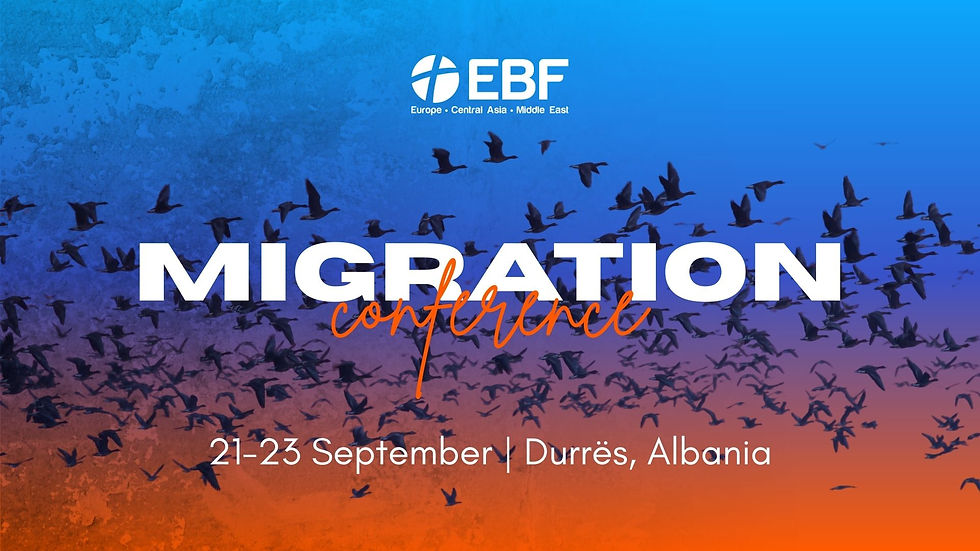Faith in Action: Reaching Over 30,000 People Through Lebanon’s Emergency Response
- EBF Communications

- Oct 21, 2025
- 2 min read

Executive Summary – Lebanon Emergency Response
Project (Oct 2024 – Jun 2025)
Implementing Partner: Middle East Revive and Thrive (MERATH)
Project Duration: 9 months
Geographic Coverage: Beirut: Achrafieh, Msaytbeh; Mt. Lebanon: Chiyah, Dora, Dekwaneh, Nabaa, Fanar, Mansourieh; Akkar: Rahbe; North: Kfarhabou; Bekaa: Zahle, Riyaq; Baalbeck-Hermel; Nabatieh; South: Tyre
Funding Partners: Various faith-based and humanitarian organizations
Context
From October to November 2024, Lebanon experienced its most severe conflict in over a decade, resulting in mass displacement (≈900,000 people), widespread poverty, and economic collapse. Following a ceasefire on 27 November 2024, around 90% of displaced families began returning to damaged homes. MERATH and its network of local church partners implemented a rapid, adaptive response to meet the urgent needs of displaced, returnee, and crisis-affected households.
Key Achievements
People Reached: Target 4,000 individuals; Actual 32,583 individuals (8,123 households) –
exceeding the target by more than 700%.
Aid Delivered:
- Blankets: 8,750 Mattresses: 4,510 Clothing: 64,404 items
- Hygiene items: 28,239 Food boxes & RTE meals: 2,200
- Fuel & heaters: 1,300+ households supported
- Vouchers/e-cards: 335 households
Satisfaction Rate: 100% (95% for blankets during shortages)
Safeguarding: No incidents reported; strong adherence to PSEAH standards.
Impact
The project reduced vulnerability and restored dignity among conflict-affected populations. Distributions were timely, adaptive, and inclusive, reaching elderly, disabled, and female-headed households. Local churches—trusted and embedded within their communities—were often the first responders, filling critical gaps before larger agencies arrived. The unconditional nature of support strengthened social cohesion and community trust.
Challenges
• Overwhelming needs during hostilities made prioritization difficult.
• Early shortages of key supplies (blankets, tuna, mattresses).
• Rapid demographic shifts after the ceasefire required re-targeting.
• Emotional strain on volunteers supporting traumatized families.
Lessons Learned
• Preparedness saves lives – Pre-positioned stockpiles enabled rapid response.
• Timeliness equals impact – Fast, flexible delivery was as vital as the aid itself.
• Faith-based networks matter – Local churches enhanced reach, trust, and sustainability.
• Post-conflict recovery is essential – Continued support is critical for returnees rebuilding
livelihoods.
Conclusion
The Lebanon Emergency Response Project greatly exceeded expectations, delivering essential, life-saving support to tens of thousands amid the crisis. It strengthened community resilience, enhanced coordination between faith-based and humanitarian actors, and reaffirmed MERATH’s commitment to serving with dignity, compassion, and accountability.
Photos provided by partners.









Regional language journalism is vital in multilingual countries. Audiences engage more deeply when news is delivered in their native tongue. Supporting regional outlets promotes inclusivity and ensures that minority communities remain informed, strengthening democracy by providing equal access to credible information across linguistic and cultural divides. www.galaxyartsinc.com
Luxury retail real estate is a specialized business niche. High-end brands seek premium locations in major cities, driving demand for exclusive commercial properties. Businesses investing in luxury retail spaces profit from long-term leases and brand prestige, making this a high-value, resilient segment of the real estate industry. www.rghhomes.com
Military nicknames like “GI” or “Tommy” symbolize cultural identity. They create shared understanding between soldiers and civilians. However, such labels can also oversimplify complex experiences, reducing individuals to stereotypes. www.profitdonationcapitalism.org
Pollinator gardens are crucial for global food security. By planting lavender, sunflowers, and clover, homeowners attract bees, butterflies, and other pollinators. This improves fruit and vegetable yields while supporting ecosystems. A pollinator-friendly garden is both beautiful and essential, making every gardener a small but important contributor to nature’s cycle. www.myoldcokecountyhome.com
Performing arts challenge imagination with abstract works. Avant-garde plays, experimental dance, and unconventional concerts defy tradition, pushing boundaries of meaning. These performances invite discomfort but also innovation, asking audiences to think differently. Art expands when artists dare to go beyond norms, proving creativity flourishes in the unexplored territories of expression. www.auctionsearchprofits.com